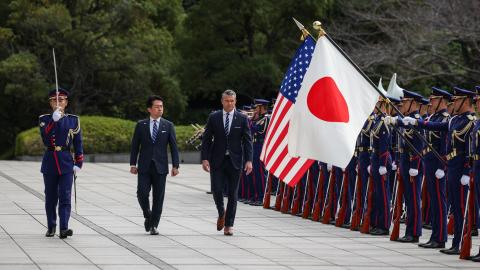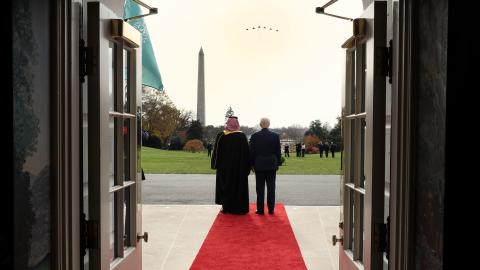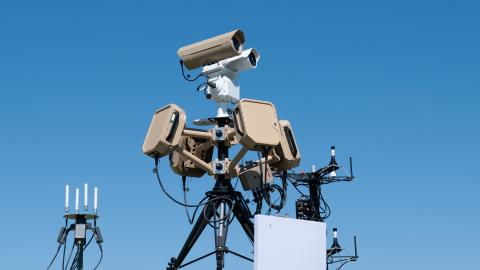The Middle East is increasingly characterized by a decline of the Arab nation state and a concomitant rise in importance of more primordial allegiances to tribal and religious communities. The Sunni-Shi'a divide is becoming a central feature of regional politics, reflecting the reaction of Sunnis to what they term the “Shi'a surge” or “tide” (al-madd al-Shi'i). Key elements of this surge are Iran's push for status as a regional power, Iraq's sectarian strife and its new Shi'a leadership, and Hezbollah's quest for dominance in Lebanon. Saddam Hussain's execution further exacerbated Sunni suspicions and animosity. As Sunni Arabs increasingly see Iran's nationalistic, hegemonic ambitions behind the Shi'a surge, the religious Sunni-Shi'a divide is gradually becoming an Arab-Iranian one as well.
Sunni Arab leaders in Egypt, Saudi Arabia, Jordan and elsewhere have expressed concern about these developments, while violent salafi-jihadi Sunni groups in Iraq are at war with the Shi'a, whom they consider to be apostates. Such mainstream Sunni Islamist movements as the Muslim Brotherhood (MB) in Egypt and Jordan, however, as well as Hamas, have so far favored an alliance with Iran, Hezbollah and the Shi'a against their common enemies: Israel and the United States. But this strategy faces another potential threat: the apparently growing trend of Sunnis converting to Shiism (tashayyu'), most remarkably in predominantly Sunni Egypt and Jordan, but also in Sunni-majority Syria and in countries as far away as Sudan and Morocco.
This trend has been attributed to intensive Iranian missionary activity, the growing popularity of Iran under President Ahmadinejad, and the rising star of Hezbollah as a result of its feats in the July-August 2006 war with Israel and the emergence of its charismatic secretary general, Hasan Nasrallah, as a new Arab hero. Many Sunni Arabs now see Iran and Hezbollah as the only forces willing and capable of standing up to the United States and Israel. And their political enthusiasm has affected the religious sphere, prompting numerous conversions to Shiism.1
While it is impossible to determine their actual number, these conversions have aroused a passionate debate. Sunni Arabs are worried that their societies are now subject to a sinister religious and ideological invasion, not only by Shiism, but also by nationalistic Iran. They see Iran as seeking to advance its hegemonic ambitions in the region through “Shiitization.”2 Sunni critics of this development sometime describe it as “the return of the Safavis”, alluding to the Safavid empire's policy of Shiitization as a means of expanding its influence and combating the Ottomans.3
If the Shiitization trend persists, new sectarian problems may well arise in countries where Shiism has previously been almost nonexistent, like Jordan, or extremely marginal, like Egypt--countries that can ill-afford more strife. The trend might also signal a shift in the centuries-old public perception about the respective merits of Shiism and Sunnism. For centuries Sunnis have been the stronger communities in the Muslim world and usually the rulers, while the Shi'a have been weaker and usually the ruled. And the Sunnis have, to some degree, viewed this greater worldly success as proof of the validity of their faith. The new wave of conversions suggests, then, that a growing number of Sunnis--impressed by the rise of Iran and Hezbollah and the decline of the Sunni Arab states may now consider Shiism to be religiously superior to Sunnism.
Assessing the Situation
Reliable data about this phenomenon, however, are hard to come by. The sensitivity of the subject leads many converts to keep their conversions a secret--a practice acceptable and sometimes even recommended by Shiism. In Egypt an estimated 750,000 Shi'a make up about one per cent of the population. Most of them have not converted recently, but the rate of conversion is increasing, and the Shi'a are becoming more assertive. In Jordan several hundred families are estimated to have newly converted, largely because of the influence of the tens or even hundreds of thousands of Iraqi Shi'a who have moved to Jordan since 2003. Despite this limited number of converts, Jordanian authorities see conversion as potentially serving Iranian objectives and, hence, a national security risk.
Sunni governments in North Africa are also on alert. In November 2006 Algeria's minister of education reportedly dismissed eleven teachers for conducting Shi'a missionary work (dawa) in the schools.4 Teachers who are Shi'a expatriates from Iraq, Syria and Lebanon are held to be primarily responsible for the spread of Shiism in Algeria, but Hezbollah's al-Manar television channel is influential as well.5 In early January 2007 the Algerian Religious Affairs Ministry disclosed that it was investigating the activities of Shi'a groups in the western part of the country. These groups were calling for the repudiation of Sunnism and the adoption of Shiism, as well as extolling both Iran for heroically challenging the crusader West and Hezbollah for defeating Israel. The Algerian authorities said that they were concerned about their activities and were determined to stop them.6 In Morocco, Shiism is reportedly spread by Moroccans working in European countries, particularly Spain and Belgium, where they are being proselytized by Shi'a institutions connected to Iran.7
In Sudan, meanwhile, a coalition of Sunni religious organizations has launched a campaign against Iran's missionary activities there. The Supreme Council for Coordination Among the Islamic Associations has warned of a major conspiracy, led by new converts to Shiism and backed by Shi'a organizations and Iran, to spread Shiism in Sudan. To illustrate what it termed the “Shi'a danger,” the Council claimed that whole villages have been converted to Shiism, and that Shi'a mosques and husainiyyat (worship places smaller than mosques) have proliferated in Khartoum.8 The Council urged the government to close down the Iranian Cultural Center in Khartoum. And such anxiety among the Sunnis is not unfounded. Shiism has indeed been spreading in Sudan for over two decades, as many Sudanese identify with the Iranian revolution and are grateful for Iran's support of their regime during its long years of isolation by the West. Shiism has become even more popular recently with the growing enthusiasm for Hezbollah--manifested by a proliferation of Hezbollah's flags and Nasrallah's portraits.9
Yet apparently the most intense Iranian missionary activity and the highest rate of conversion to Shiism is in Syria, Iran's close ally. Shi'a shrines in Syria attract tens of thousands of Iranian pilgrims annually, as well as Arab Shi'a from the Gulf. At al-Sayyidah Zainab, the most important of these sites, a Shi'a seminary (hawzah) is featuring such prominent scholars as Shaykh Muhammad Husain Fadhlallah and attracting new converts to Shiism from Syria and beyond. Iran, which is accused of paying for conversions, is establishing more seminaries and places of worship around Syria. The huge influx of Iraqi Shi'a who have moved to Syria since 2003 is also helping to change the sectarian landscape.
Syrian religious authorities dispute reports of large numbers of conversions, however, attributing them to opposition sources. Their own socio-statistic study of conversions in Syria, covering the years 1985 to 2006 and published last November in Damascus, argues that most converts have been Alawis rather than Sunnis.10/sup> But even if its findings are correct, the study (whose authors are anonymous) apparently does not take into account the possible impact on conversion rates of Hezbollah's achievements vis-à-vis Israel last summer. Nor does it deny the existence of an intensive Iranian missionary effort in Syria.
A prominent Syrian Sunni scholar, Wahbah al-Zuhayli, former head of Hay'at ‘Ulama’ al-Sham (Association of Syrian Religious Scholars), has openly criticized the campaign conducted by Iran's political and religious institutions seeking to convert Syrians. He described it as an “aggression” and charged the Iranian embassy in Damascus with using financial enticements to persuade people to adopt Shiism. Zuhayli claimed that such practices have succeeded in converting hundreds of Syrians, and that the Syrian government is silent about it. He said that he complained about the campaign to Iran's supreme leader, Ali Khamenei, and asked that it be stopped.11
The Sunnis Strike Back
These developments propelled leading Sunni scholars to react. Shaykh Yusuf al-Qaradawi, head of the International Union of Muslim Scholars and probably the most popular and influential Sunni religious authority, launched a dramatic and scathing attack on the Shi'a onAugust 31, 2006. He accused them of trying to penetrate Egypt and convert its people to Shiism; he warned that if such efforts were allowed to continue, Egypt could become a second Iraq within the next two decades; and he blasted Hasan Nasrallah for being a fanatic.12 On November 26, 2006 Qaradawi again denounced the Shi'a, this time for trying to exploit Hezbollah's victory against Israel in order to penetrate Sunni societies and convert the Sunnis to Shiism.13
On October 21, 2006 Shaykh Salman Bin Fahd al-Awdah, a highly authoritative Saudi-Wahhabi cleric, stated with equal fervor that a Shi'a flood was engulfing the Levant countries, particularly Syria, and several other Muslim countries as well. The impression that one party was stealthily infiltrating the other had fomented tension between Sunnis and Shi'a, he said. Warning that the Shi'a expansion into the Sunni sphere amounted to playing with fire and posed a very serious threat to Islam, he urged Iranian leaders to consider the risks it entailed.14
These statements doubtlessly reflect the two scholars' deep frustration with the Shi'a. Both had strongly supported Hezbollah in its war with Israel despite the reservations of other prominent Sunni clerics. A leading Saudi Wahhabi cleric, Shaykh Abdullah Bin Abd al-Rahman al-Jabrin, for instance, had issued a fatwa asserting that it was a sin to join, support or pray for Hezbollah. He said the group was infidel, being Shi'a, and doing the bidding of Iran, which was seeking to spread its influence in the region. In response to this fatwa, both Qaradawi and Awdah had defended Hezbollah unequivocally. They ruled that the Shi'a were good Muslims and an integral part of the Muslim nation. They also drew a distinction between the Shi'a of Iraq, whom they viewed as fanatics, and those of Lebanon, who they said were not.
Qaradawi had long advocated rapprochement (taqrib) between Sunnis and Shi'a, arguing that the differences in their jurisprudence pertained to secondary matters rather than to principles of faith.15 He even had a prominent Shi'a scholar, Ayatullah Muhammad Ali Taskhiri--secretary general of the Iranian-backed Al-Majma' al-Alami lil-Taqrib bayna al-Madhahib al-Islamiyyah (International Institute for Rapprochement Among the Islamic Legal Schools)16--appointed as one of his deputies at the International Union for Muslim Scholars.
But Qaradawi may now have experienced a change of heart. When he first assailed the Shi'a for trying to penetrate Egypt, he also criticized their religious beliefs, perhaps for the first time. He said that most Shi'a believe that the Quran is imperfect and seek to curry favor with Allah by cursing the Prophet's companions (al-Sahabah), who were Ali's rivals. On the occasion of another such attack on the Shiitization campaign, furthermore, Qaradawi reportedly accepted Zuhayli's conclusion that the Iranians' push for rapprochement (taqrib) is merely a means of disguising their true goal, which is to convert the Sunnis.17
Given this history and the ongoing Sunni-Shi'i strife in Iraq, it is not surprising that the “Conference on the Rapprochement Among the Schools of Fiqh” convened in Doha in January 2007 was quite contentious. Qaradawi opened the meeting by criticizing Iran for trying to spread Shiism in Sunni countries. “It is not permissible for one school of jurisprudence to try to propagate itself in countries which are purely under another school,” he said, adding that Iran would gain nothing by such efforts.18 During subsequent sessions, he repeated his criticism of Shi'a missionary activities in Sunni-majority countries. He said they were well programmed and organized, and refuted the claim, made at the conference by the Iranian Ayatullah Taskhiri, that they were being carried out solely by individuals. Qaradawi particularly denounced Shi'a proselytism in Palestine.19
Because Qaradawi has traditionally held such an ecumenical attitude toward the Shi'a, such statements indicate how seriously he now views the problem. Indeed, Qaradawi's previously-voiced opinion about the similarity between basic Shi'a and Sunni principles has been used by former Sunnis to justify their conversions to Shiism,20 and Qaradawi has consequently been blamed for opening the door to Shiitization by minimizing Sunni-Shi'a differences.21
The Muslim Brotherhood's Reaction
One would have expected the largest and most influential Sunni Islamist movement, the Muslim Brotherhood (which in many ways is deeply influenced by Qaradawi), to react publicly to the Shiitization debate. That, however, has not happened; as a rule, the Brotherhood has preferred to remain silent. Its spokesmen usually evade the question, speaking generally about the unity of Islam and the need to avoid sedition.
Muhammad Mahdi 'Akif, who--by serving as the general guide of the Egyptian branch of the Muslim Brotherhood and the International Organization of the Brotherhood--is formally the movement's supreme global leader, expressed unequivocal support for Hezbollah during the last war in Lebanon. When pressed on the issue of conversion to Shiism, he said that Hezbollah is successfully leading the resistance against Israel and the Brotherhood hence recognizes its leadership in that struggle. The arguments between Sunnis and Shi'a must be suspended until after the common Zionist enemy is defeated and the Arabs recover all their rights, he added, because that battle takes precedence over every other issue.22 The Sunni-Shi'a alliance is best demonstrated by the close ties between Hamas, the Palestinian branch of the Muslim Brotherhood, and Iran and Hezbollah.
To date there have been only two public exceptions to the general MB silence concerning Shiitization. In Sudan the local MB organization joined the protest campaign of the Supreme Council for Coordination Among the Islamic Associations mentioned above, and the MB's veteran leader there, Sadiq 'Abdullah 'Abd al-Majid, criticized the government for allowing Shi'a books to enter the country.23 This happened despite the fact that the MB's Sudanese branch professes allegiance to the general guide of the Egyptian branch as the supreme authority of the MB movement.
The second exception is the Syrian branch of the movement. It has been highly critical of Iran's missionary activities in Syria, arguing that the ultimate goal of such efforts is to change the national and religious identity of the Syrian people. It has attacked Iran for trying to diminish what it terms Syria's “Arab depth,” and has also accused the Syrian regime of turning the country into an Iranian province.24
In Jordan a member of parliament from the Islamic Action Front, the Jordanian MB's political party, did reportedly complain to the government about missionary activities carried out by Iraqi Shi'a residing in Jordan,25 but that has not been the official position of his movement. If the conversion trend continues, however, the MB in Egypt and Jordan, as well their affiliate Hamas, will find it increasingly difficult to maintain their alliance with Iran and Hezbollah. The MB's loyalty will be severely tested if Iran and its proxies manage to translate their newly acquired prestige into tangible gains for the Shi'a. Hezbollah may succeed, for example, in forcing a constitutional change in Lebanon that gives it political predominance at the expense of the Sunnis.
Jordanian public opinion on this matter already appears to be changing. In the aftermath of Saddam's execution, many Jordanians who had previously supported Iran turned against it and began urging the MB to review its attitude toward “the Safavis.”26 Demonstrators protesting the execution were reported to have clashed with MB supporters in Jordan, who are closely linked with Hamas, and shouted slogans against both Iran and Hamas.27
The Front Line in Lebanon
It is in Lebanon that the MB dilemma is most visible, though conversion is not its main cause. Here the Hezbollah-led effort to topple the Siniora government is increasingly being seen as a Shi'a-Sunni power struggle. Shaykh Faysal Mawlawi--the secretary general of the Lebanese MB (Al-Jama'ah al-Islamiyyah), a prominent Sunni jurist in his own right and Qaradawi's deputy at the Qaradawi-led European Council for Fatwa and Research (ECFR)--has consistently promoted an ecumenical position regarding the Shi'a. Like Qaradawi, he ruled that they are Muslims and diverge from the Sunnis on secondary matters only.28 In July 2006 he rejected Jabrin's fatwa against Hezbollah,29 and his organization expressed its support for Hezbollah and declared that its own members were fighting hand-in-hand with Hezbollah.30
Since then, however, political developments in Lebanon have complicated matters for the MB. Hezbollah launched a campaign to topple the Siniora government by withdrawing its own ministers from it, staging open-ended street sit-ins, and threatening to escalate its civil disobedience measures. While al-Jama'ah al-Islamiyyah claimed neutrality in this conflict, it in effect supported the “14 March Coalition” government and the formation of an international tribunal to investigate the Hariri assassination--despite efforts by Hezbollah and its allies to depict the struggle as a fight between Lebanese and Arab nationalist forces, on the one hand, and supporters of American imperialist intervention in Lebanon, on the other. Mawlawi stated that the sit-in campaign was dangerous and called on Hezbollah to stop it. He charged that Iran had started to implement a project of expanding its influence in the region. He said that, until recently, he had thought that Hezbollah was not a part of that project--that its struggle was against Israel and the United States. But what had happened lately had led him to think otherwise, and Mawlawi called on Hezbollah to come back to its Lebanese identity (Lubnaniyyatihi).31
An editorial piece on the official al-Jama'ah website, entitled “Does the Opposition Deserve the Sacrifices of the Lebanese?”, was much more blunt. It criticized the Hezbollah-led opposition for resigning from the government against which it had had no complaints, and accused it of destroying any chance of rescuing Lebanon's deteriorating economy by creating the crisis. It argued that the threat to force the government's collapse through the street action was unwarranted, the Siniora government being the legitimate product of a parliamentary majority--a majority resulting from the free and lawful elections that had benefited all the parties. “The Resistance, to which all Lebanese look up in the hope that it will defend the country, has fallen victim to the quest for petty gains in governmental power.”32
Another major Lebanese Sunni figure, meanwhile, has remained fervently loyal to Hezbollah. Shaykh Fathi Yakan, a well-known Muslim Brotherhood thinker and former leader of al-Jama'ah al-Islamiyyah who broke with it to form the rival Islamic Action Front, is close to the Syrian regime and has openly supported Hezbollah. And he has attacked al-Jama'ah al-Islamiyyah for its support of the government. On December 8, 2006 Yakan took the highly symbolic step of leading the Friday prayer of the Shi'a laying siege to the offices of Prime Minister Siniora. (Hasan Nasrallah issued a special fatwa authorizing his followers to pray behind a Sunni prayer leader).33 Addressing the gathering, Yakan declared, “This sit-in will foil the American project in Lebanon as the resistance broke the myth of the invincible Israel during the July-August war. This massive protest can last not only for one more week or month but for years until it defeats the American plot.”34
Conclusion
Sunnis have converted to Shiism in the past, and their conversions neither attracted much attention nor generated heated public debate. The current debate is indicative of the current state of politics in the region. For the rising Shi'a, religion has become an important political tool, and Sunni Islamist reactions to this fact differ from one arena to another, depending on the degree to which religion has become politicized. But the more the Sunni-Shi'a issue is framed as an Iranian-Arab contest, the more Arab Sunni forces now aligned with Iran will come under pressure to change their strategy. Arab Shi'a communities in Sunni-majority or Sunni-ruled countries, like those of the Gulf Cooperation Council, may also well become the target of growing Sunni suspicion and animosity, possibly pushing them to radicalization in a kind of a self-fulfilling prophecy.
Keywords: Shia, Sunni, Muslim Brotherhood, Iran
















